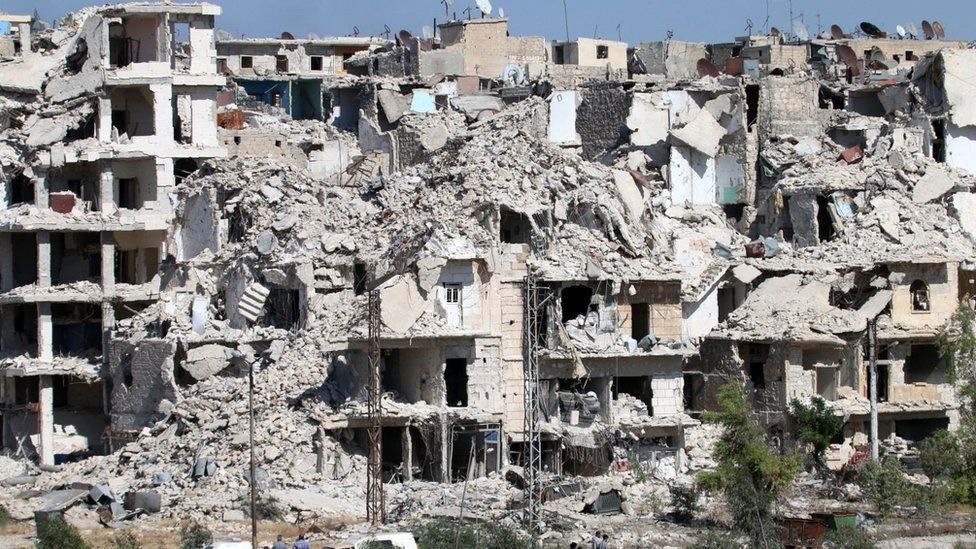Syria conflict: 'Families leave' besieged Aleppo
- Published

Dozens of families have left besieged eastern areas of the city of Aleppo along a humanitarian corridor, Syrian state media say.
They say the civilians boarded buses and were taken to temporary shelters.
Some rebels had also surrendered to government forces, the report says.
Russia, an ally of the Syrian government, earlier said four exit corridors would be opened. But Syria's opposition says they are a government ploy to recapture all of Aleppo.
"These corridors are not for getting aid in, but driving people out," said Basma Kodmani of the opposition High Negotiations Committee.
"The brutal message to our people is: leave or starve."
The opening of the corridors has been welcomed cautiously by the UN, the US and some aid agencies.
However, Washington has suggested the plan may be an attempt to force the evacuation of civilians and the surrender of rebel groups in the city.
On Friday, the United Nations envoy to Syria said the corridors should be administered by the UN and that there should be a 48-hour ceasefire for people to leave safely.
About 300,000 people are trapped in rebel-held eastern Aleppo and the UN says food supplies are expected to run out in mid-August.
"This morning dozens of families left via the corridors identified... to allow the exit of citizens besieged by terrorist groups in the eastern neighbourhoods," Syrian state news agency Sana reported.
It showed pictures of people, mostly women and children, walking past soldiers and getting onto buses. It said they were taken to temporary shelters but gave no details.
The report also said some fighters had surrendered to the authorities.
A Russian army spokesman said 85 civilians and 29 fighters had left via the corridors on Friday and 52 civilians and 24 fighters on Saturday.
Lt-Gen Sergei Chvarkov told the state-owned Russian news channel Rossiya 24 that four more corridors would be opened up.
He also said that six temporary shelters had been set up to accommodate at least 3,000 people.
Syrian President Bashar al-Assad has offered an amnesty for rebels surrendering within three months.
UK-based monitoring group the Syrian Observatory for Human Rights also said that "a number" of civilians had left eastern Aleppo through a passage in the Salaheddin neighbourhood.
Some reports have said rebel groups are preventing civilians from leaving.
Rebels have been in control of much of eastern Aleppo since July 2012 but the Syrian army, backed by pro-government militia and Syrian and Russian jets, has recently driven them back.
The government recently seized the northern suburb of Bani Zeid after fierce fighting.
UN envoy Staffan de Mistura said on Friday the UN supported the humanitarian corridors in principle but it wanted Russia to provide more details on how they would work.
"Our suggestion to Russia is to actually leave the corridors being established at their initiative to us," Mr de Mistura told reporters in Geneva.
"The UN and humanitarian partners know what to do."
US Secretary of State John Kerry said that if the operation was "a ruse" it could disrupt US-Russian co-operation in Syria.
"On the other hand, if we're able to work it out and have a complete understanding of what is happening and then agreement on (the) way forward, it could actually open up some possibilities," he said.